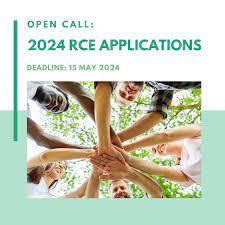
https://www.rcenetwork.org/portal/call-rce-applications
OPEN CALL: 2024 RCE APPLICATIONS
Organisations that are interested in initiating the RCE process and applying to become an RCE are invited to submit a main application document along with the application summary by 15 May 2024 (12:00pm, noon JST) to UNU-IAS.
- Sample Application 1 - RCE Greater Portland
- Sample Application 2 - RCE Bordeaux Aquitaine
Timeline
Below is the schedule for RCE application procedures for 2024. Please note that this schedule may be subject to change.
|
Due date |
Process of application submission |
|
15 November 2023 |
Open call for applications |
|
15 May 2024 |
Submission of the first main application document and application summary |
|
30 June 2024 |
Comments from the Global RCE Service Centre and Peer Reviewers |
|
30 September 2024 |
Submission of the final application and application summary |
|
November/December 2024 (TBD) |
Evaluation at 19th Ubuntu Committee of Peers for the RCEs Meeting |
TO APPLY: Applications should be sent electronically to the Global RCE Service Centre at rceservicecentre@unu.edu by 15 May 2024 (12:00pm, noon JST).
For resources on the benefits of being an RCE member please visit our resources centre here.
The Ubuntu Alliance, in its meeting in April 2006 in Yokohama, established the Committee of Peers for RCEs. This Committee and Regional Advisors review applications for new RCEs and provide recommendations to United Nations University during the RCE acknowledgement process. The United Nations University Institute for the Advanced Study of Sustainability (UNU-IAS) acts as the secretariat of the Ubuntu Alliance.
ABOUT
RCE VISION AND MISSION
https://www.rcenetwork.org/portal/rce-vision-and-mission
In 2002, the UN General Assembly adopted a resolution announcing the Decade of Education for Sustainable Development (UNDESD 2005-2014), based on the Johannesburg Plan of Implementation. The United Nations Scientific and Cultural Organization (UNESCO), the lead agency for the UNDESD, stressed the need to reorient existing education towards sustainability.
In 2003, in response to the UN resolution on the UNDESD, the United Nations University Institute for the Advanced Study of Sustainability (UNU-IAS) launched the ESD project, with funding support from the Ministry of the Environment, Japan. The ESD project designs and implements research and development activities through two flagship initiatives: a global multi-stakeholder network of Regional Centres of Expertise on ESD (RCEs) and a network of higher education institutions called the Promotion of Sustainability in Postgraduate Education and Research Network (ProSPER.Net).
Moving forward, UNESCO has now presented the ESD for 2030 Roadmap with its five priority areas of action: advancing policy, transforming learning environments, building capacities of educators, empowering and mobilizing youth, and accelerating local level actions. At all levels of society, RCEs play a crucial role in implementing these goals using their local knowledge and global network.
As of August 2023, 190 RCEs have officially been acknowledged by the United Nations University worldwide. The Global RCE Service Centre is headquartered at UNU-IAS, where it provides assistance to individual RCEs and facilitates their communication and networking.
RCE Vision
RCEs aspire to translate global objectives into the context of the local communities in which they operate. Upon the completion of the DESD in 2014, RCEs are committed to further generating, accelerating and mainstreaming ESD by implementing the ESD for 2030 Roadmap, and contributing to the realization of the Sustainable Development Goals (SDGs).
RCE Mission
The planet faces a number of sustainability challenges, from climate change and the rapid extinction of species to the necessary modification of our consumption patterns. International platforms exist to tackle each of these issues: the United Nations Framework Convention on Climate Change (UNFCCC) mission is to reduce greenhouse gas emissions globally, keeping in mind action need to happen at the local level; the 10 Year Framework Programme on Sustainable Consumption and Production (10YFP on SCP) which is examining ways how consumer behaviour and industrial production patterns can shift towards a more sustainable use of the planet’s resources; and the Convention on Biological Diversity (CBD) as well as the Intergovernmental Platform on Biodiversity and Ecosystem Services (IPBES), both platforms bring scientists and policy makers together in a mission to protect the world’s biota.
Each of these global platforms needs to be implemented at a local level. With their official links to UN agencies, formal education institutions, and informal educators worldwide, RCEs are in an ideal position to do just that. The Global RCE Network brings together multi-sectoral and interdisciplinary members who might not usually work together. As such, they are uniquely placed to help create solutions to sustainability challenges through dialogue, education and learning. They are highly influential policy advocates, able to test policies individually and work collectively to bring policy to scale and advice on future actions.









